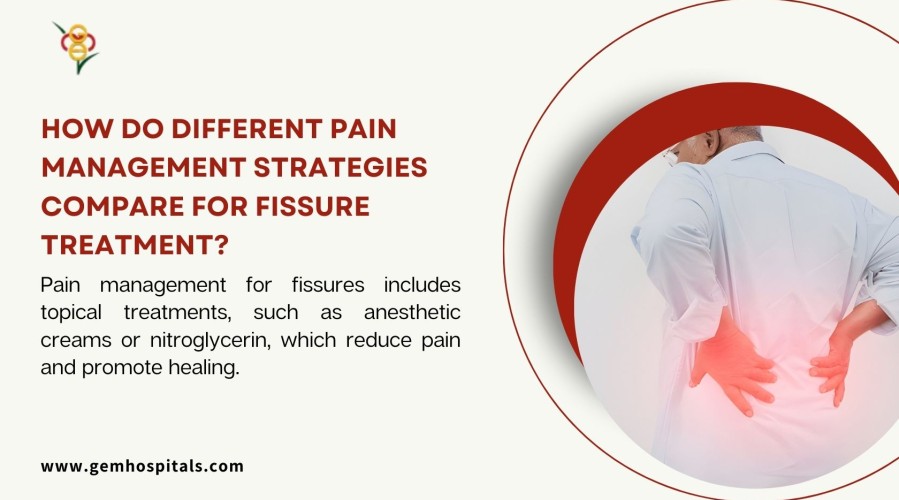Learn effective solutions for digestive problems with expert tips to improve gut health, reduce discomfort, and maintain a healthy digestive system.
How do different pain management strategies compare for fissure treatment?

Anal fissures are a well-known condition that has effects on the lining of the anus. Usually, anal fissures are due to the small tear or crack in the anus lining that may cause severe pain and discomfort while bowel movements. The majority of anal fissures will heal by itself but there are some which require proper and enough treatment and management strategies. That could give you hands-on alleviating the pain and also promote the healing processes. The pain of the fissure is going to be intensified in that case it may have an impact on the quality of life to overcome it right strategies should be adopted. From the blog, you can take out the knowledge on different pain management strategies for fissure treatment.
Lifestyle modifications
One of the most effective ways to handle the pain of anal fissures is by bringing lifestyle modifications. Lifestyle changes are often the first line of defense in managing anal fissure pain. These adjustments focus on softening stools and reducing strain during bowel movements, which are the primary causes of pain in fissure patients.
- Taking fiber-rich foods like fruits, vegetables, and whole grains will help you soften your stools and make bowel movements easier. Through this, you can reduce strain and the risk of further tearing, which can alleviate pain. Patients are often encouraged to drink plenty of water to keep stools soft.
- Keep yourself hydrated that can also keep stools soft, which minimizes the irritation caused by hard or dry stools passing through the anal canal.
- A warm sitz bath (soaking the anal area in warm water for 10–20 minutes) can soothe pain and promote blood flow to the affected area. Sitz baths can be done several times a day, especially after bowel movements, to relieve pain and encourage healing.
Topical medications
Along with the lifestyle modifications following the right topical medications could provide you the surprising results. They are often used to directly manage the pain and inflammation associated with anal fissures. These treatments are applied directly to the affected area, offering targeted relief.
- Topical anesthetics like lidocaine are commonly prescribed to numb the pain. Lidocaine provides short-term pain relief by blocking nerve signals in the area, making bowel movements less painful.
- Nitroglycerin ointment is a widely used topical treatment for chronic fissures. It works by relaxing the anal sphincter muscles and increasing blood flow to the area, promoting healing and reducing pain.
Oral medications
- Oral medications may be prescribed to manage fissure-related pain, particularly in cases where topical treatments are insufficient. These medications address both pain and the underlying causes of the fissure.
- Over-the-counter pain relievers such as acetaminophen or ibuprofen can be used to reduce discomfort. These medications provide general pain relief but may not be as effective as targeted treatments.
- Oral stool softeners such as docusate help ease bowel movements, reducing strain and pain associated with passing hard stools. These are often prescribed in combination with dietary changes to promote healing.
Botulinum toxin (Botox) injections
Botox injections are a more advanced treatment option for chronic fissures. Botox works by temporarily paralyzing the anal sphincter muscles, reducing spasms and pain, and allowing the fissure to heal.
Surgical options
For patients with chronic fissures that do not respond to conservative treatments, surgery may be recommended. The most common surgical procedure is lateral internal sphincterotomy, which involves cutting a portion of the anal sphincter muscle to reduce spasm and promote healing.
Managing pain associated with anal fissures generally requires a multiple level of approaches including lifestyle changes to more advanced treatments. Even though you follow the effective way to reduce the pain chronic anal fissures require intensive interventions through having the right healthcare professional by your side you can get proper guidance in adopting an effective strategy for reducing the pain ultimately improving the quality of life.
For early diagnosis or preventive care, consult the specialists at Gem Hospital.
Contact us today for expert guidance and personalized treatment options!
Blogs & Article
Explore current research trends in digestive health, including new treatments, advanced diagnostics, and innovations improving gut health and patient care.
Discover common digestive health myths and the real facts. Learn simple tips to improve gut health and maintain better digestion for a healthier life.


